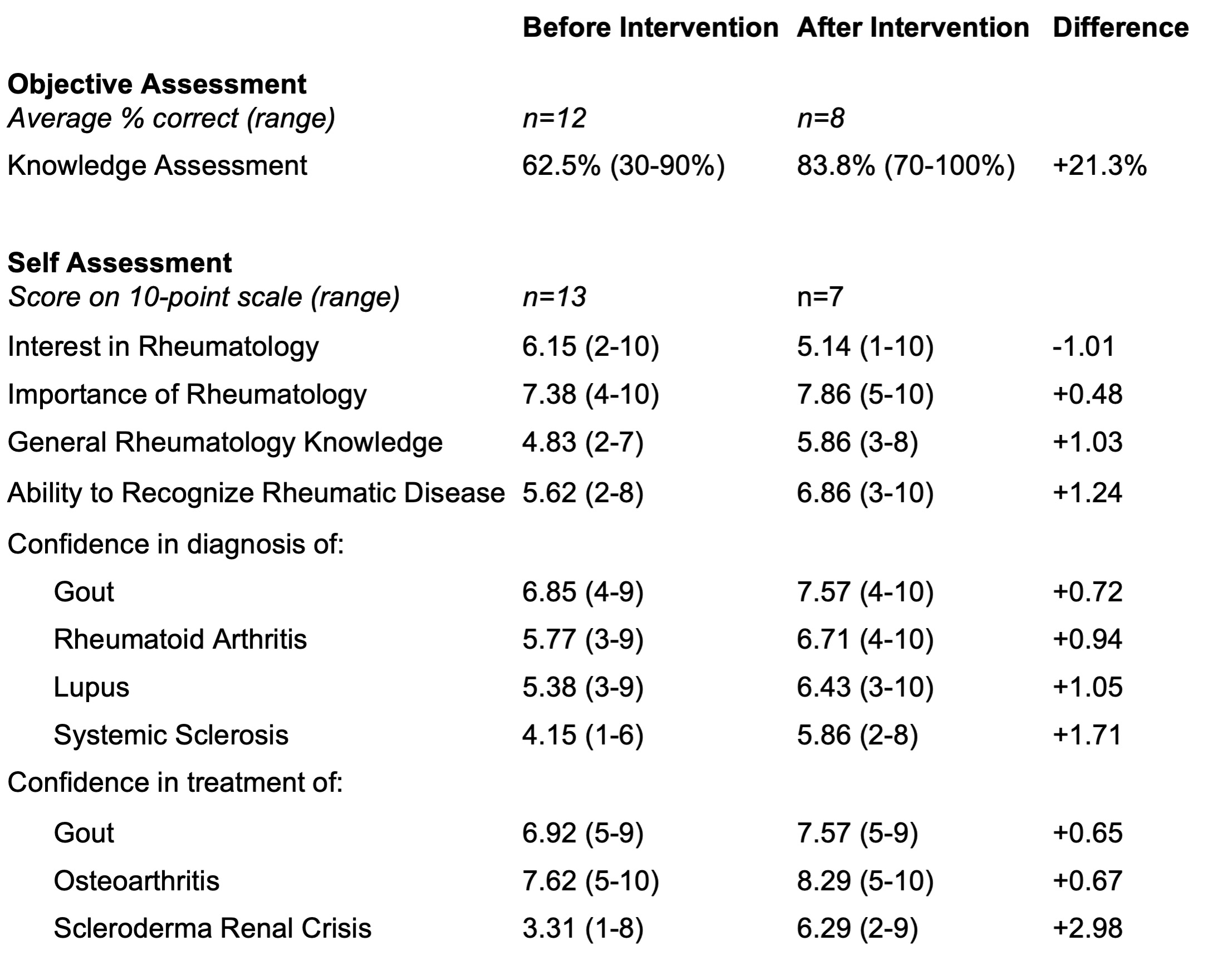Session Information
Session Type: Poster Session C
Session Time: 10:30AM-12:30PM
Background/Purpose: Rheumatology is an important field with topics encountered commonly on board exams and clinically, yet it remains an area of low confidence for trainees. This innovative project seeks to increase resident competency and confidence in rheumatology topics. As a part of this unique project, fellows also expand and gain confidence in their teaching skills.
Methods: Internal medicine residents rotating on the rheumatology consult service at University of Alabama Birmingham (UAB) were asked to answer a pre-rotation quiz and survey to gauge initial rheumatology knowledge and confidence. Rheumatology fellows voluntarily signed up to develop and deliver weekly didactics to the residents on common or high-yield rheumatology topics of their choice. The primary outcome was residents’ gain in rheumatology knowledge as measured by changes in objective quiz assessment and subjective self-assessment obtained at baseline compared with assessments obtained after rotation completion. The pre- and post-tests contained similar, but not identical, questions randomized from a set in order to best gauge learners’ increase in knowledge rather than recalling the correct answers. We also evaluated changes in learner confidence in diagnosing common rheumatic diseases (gout, rheumatoid arthritis, lupus, scleroderma), and confidence in treating common or important diseases encountered in rheumatology (gout, osteoarthritis, scleroderma renal crisis). First year fellows completed surveys before and after participation in the project regarding career plans and confidence in teaching skills.
Results: A total of 15 internal medicine residents voluntarily completed at least one portion of the evaluations (n=12 pre-rotation quiz, n=8 post-rotation quiz; n=13 pre-rotation survey, n=7 post-rotation survey). Average pre-rotation quiz scores were 62.5% correct compared with 83.8% correct post-rotation (Table 1). The lowest area of confidence for learners was perception of the ability to treat scleroderma renal crisis (3.31 out of 10 confidence). The area of highest confidence for learners was perception of the ability to treat osteoarthritis (7.62 out of 10 confidence). Post-rotation, there was observed increase in self-assessed confidence in all surveyed areas, with the largest increase in treatment of scleroderma renal crisis (from 3.31 out of 10 confidence to 6.29 out of 10 confidence). Fellows reported increased confidence in overall teaching skills as well as ability to plan and deliver a successful teaching session (Table 2). All fellows reported significant improvement in their overall rheumatology knowledge as a result of participating in the project (Figure 1).
Conclusion: This project highlights the importance of dedicated rheumatology education within internal medicine and provides a unique way to directly engage rheumatology fellows in the education of medicine residents with mutually beneficial effects.
 Table 1: Resident assessments show increased rheumatology knowledge by objective measures and self-assessed measures. Objective assessment was based on percent correct of 10 randomized unique multiple choice quiz questions both before and after rotation. Self-assessments were rated on a 1 to 10 scale, with 10 being the highest.
Table 1: Resident assessments show increased rheumatology knowledge by objective measures and self-assessed measures. Objective assessment was based on percent correct of 10 randomized unique multiple choice quiz questions both before and after rotation. Self-assessments were rated on a 1 to 10 scale, with 10 being the highest.
.jpg) Table 2: Fellows gained confidence in overall teaching skills and ability to plan and deliver a teaching session after implementation of the program. Self-assessments were rated on a 1 to 10 scale, with 10 being the highest. Post-fellowship plans were determined by a multiple-choice question, absolute difference is reported.
Table 2: Fellows gained confidence in overall teaching skills and ability to plan and deliver a teaching session after implementation of the program. Self-assessments were rated on a 1 to 10 scale, with 10 being the highest. Post-fellowship plans were determined by a multiple-choice question, absolute difference is reported.
.jpg) Figure 1: All fellows reported some level of improvement in key teaching skills. All fellows reported significant improvement in their personal overall rheumatology knowledge.
Figure 1: All fellows reported some level of improvement in key teaching skills. All fellows reported significant improvement in their personal overall rheumatology knowledge.
To cite this abstract in AMA style:
Bowman R, Huddleston E, Lipham B, Alexander A. Successful Implementation of an Innovative Rheumatology Curriculum for Internal Medicine Residents: Fellow-Initiated Rheumatology EDUcation Project (FIRED UP) [abstract]. Arthritis Rheumatol. 2025; 77 (suppl 9). https://acrabstracts.org/abstract/successful-implementation-of-an-innovative-rheumatology-curriculum-for-internal-medicine-residents-fellow-initiated-rheumatology-education-project-fired-up/. Accessed .« Back to ACR Convergence 2025
ACR Meeting Abstracts - https://acrabstracts.org/abstract/successful-implementation-of-an-innovative-rheumatology-curriculum-for-internal-medicine-residents-fellow-initiated-rheumatology-education-project-fired-up/
